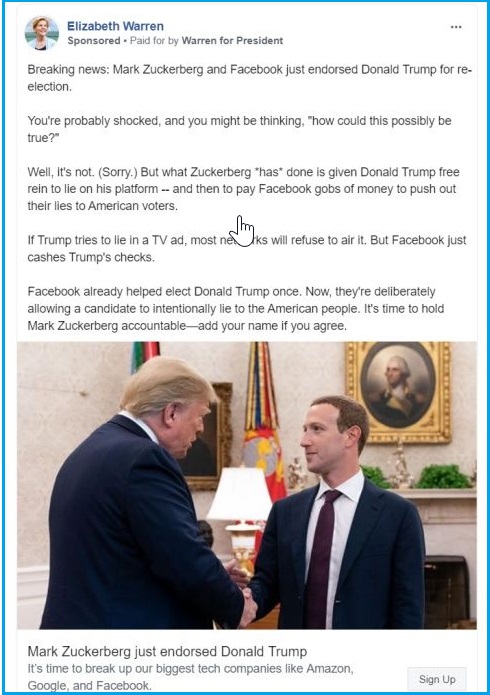Facebook employees are revolting against their company’s policy of allowing politicians to post whatever they want on the platform, with hundreds of staff warning it is a “threat” to the platform.
More than 250 Facebook employees have signed an open letter to the company’s founder and CEO Mark Zuckerberg and its top executives, calling on them to rethink its stance of not fact-checking political ads and allowing ones containing misinformation to stay public.
“Free speech and paid speech are not the same thing,” the letter said. “Misinformation affects us all. Our current policies on fact-checking people in political office, or those running for office, are a threat to what FB stands for.
“We strongly object to this policy as it stands. It doesn’t protect voices, but instead allows politicians to weaponise our platform by targeting people who believe that content posted by political figures is trustworthy.”
Facebook announced last month that it would be letting politicians and presidential candidates have virtually free reign over what they post on the platform.
The company will not be fact-checking the advertisements posted by politicians, and will allow ads that have false statements in them to remain on the platform as they are “newsworthy”.
It was a controversial change in policy for the social media giant, which had previously banned paid ads that included “claims debunked by third-party fact checkers”.
The policy has been widely criticised, including by US presidential candidates, with Elizabeth Warren even taking out her own ad on the platform deliberately featuring false information.

A Facebook ad by Elizabeth Warren. Image: Facebook
Warren then labelled Facebook a “disinformation for profit machine”.
In the letter, the Facebook workers said that a “large part of the employee body does not agree with this policy”.
“We want to work with our leadership to develop better solutions that both protect our business and the people who use our products,” it said. “We know this work is nuanced, but there are many things we can do short of eliminating political ads altogether.”
The employees said that political ads should be held to the same standards as other ads; that there should be stronger visual design treatment for them so they are easier to distinguish from organic content; for a restriction on the targeting of political ads; broader observance of the election silence periods; and spending caps on the ads.
“We are proud of the work that the integrity teams have done, and we don’t want to see that undermined by policy,” the staff wrote. “Over the coming months, we’ll continue this conversation, and we look forward to working towards solutions together. This is still our company.”
Despite the widespread criticism, Zuckerberg recently doubled down on the policy, warning against the potential of “cracking down too much”, arguing that Facebook doesn’t have an obligation to “referee” political ads and that “banning political ads favours incumbents and whoever the media covers”.
At a recent hearing before the US congress, Zuckerberg was unable to say whether Facebook would remove an ad falsely claiming that Republicans had voted for the Green New Deal, or one containing hate speech.










